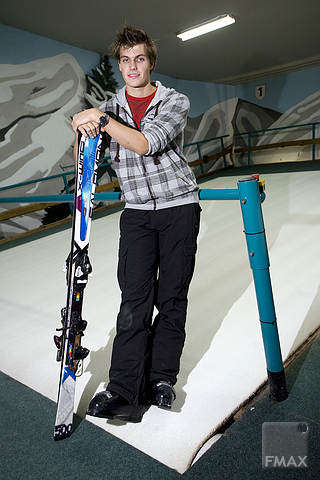Jeroen Kremer (21, werktuigbouwkunde) leerde zelf skiën op het rollende tapijt. Nu geeft hij les op een baan in Den Hoorn. Jeroen Kremer (21, werktuigbouwkunde) leerde zelf skiën op het rollende tapijt.
Nu geeft hij les op een baan in Den Hoorn.
“Twee jaar geleden heb ik in Oostenrijk het diploma voor skileraar gehaald. In de herfst van 2008, voorafgaand aan het nieuwe winterseizoen, zag ik dat het qua tijd niet ging lukken om in de sneeuw les te geven. Als je zoiets doet, moet je dat voor een paar maanden doen, vind ik. Het kwam alleen met de studie niet goed uit. Op internet ging ik vervolgens op zoek naar een plek waar ik in ieder geval mijn techniek kon bijhouden. Het lesgeven zat in het achterhoofd. Bij het eerste bezoek liep ik toevallig iemand van personeelszaken tegen het lijf. Bleken ze net mensen nodig te hebben.”
“Van de eerste les kan ik me weinig meer herinneren. Het was spannend, dat wel. Er zou iemand komen kijken, maar dat gebeurde niet. Zelf vond ik dat prima, kon ik gewoon mijn gang gaan. Ik had een paar kinderen in de groep en weet nog dat de ouders na afloop tevreden waren. Een opluchting uiteraard. Huilende kinderen heb ik sowieso nog niet veel gehad. Als er eens eentje onderuit gaat zet ik de band direct stil. De mat is zacht, dus echt pijn doet het nooit.”
“Dinsdag is mijn vaste avond dit seizoen, dat voor mij loopt van 1 oktober tot 1 april. Ook woensdagmorgen sta ik ingeroosterd, maar die uren zijn niet altijd gevuld. Bovendien val ik in voor collega’s. Vrij veel, maar het gaat niet ten koste van colleges. Rond de vakanties wordt het trouwens altijd drukker, met het toppunt tussen kerst en nieuwjaar. Lekker chaotisch is het dan, want veel collega’s staan zelf in de sneeuw. Je werkt wel een paar dagen met dezelfde groep, wat het weer erg leuk maakt.”
“Techniek staat voorop bij de lessen op een rollerbaan. Het prettige is dat ik de hele les dicht bij de skiër sta. Zo kan ik goed zien wat iemand fout doet en direct aanwijzingen geven om dingetjes bij te schaven. De spiegel helpt daar zeker bij. Ik geef les aan jong en oud, maar hoewel we een studententarief hebben, zitten er weinig studenten tussen. Ze zijn, denk ik, nog onbekend met het concept.”
Bijbaan: Skileraar
Verdiensten: €9,- per uur
Opvallend: Wil nog eens een maand of drie in de sneeuw les gaan geven
In times of economic crisis, issues like sustainability and ethics are often ignored. Professor Jeroen van den Hoven is however cautiously optimistic that this crisis will be different. He is a professor of moral philosophy at TU Delft’s TPM faculty and chairman of the Ethics and Technology platform, which organizes the annual Mekel Prize. “This credit crisis is being seen as a chance for a new start. To end this crisis, investments must be made, and people are now calling for money to be invested in sustainable energy and technology.”
The Mekel Prize, which comes with a 1,000 euro cash prize for the winner, is awarded to the student who writes the best essay on a subject involving ethics and technology. The prize is named after J.A.A. Mekel, a TU Delft professor who, as a member of the Dutch resistance during WWII, was executed by the Nazis in 1942.
Each year, Rector Fokkema, chairman of the Mekel Prize jury, reads the submitted essays with great pleasure. “I’m not only consistently amazed by their high quality, but also by the wide variety of subjects tackled in the essays. Last year’s winner, Sergio Carrasco-Martos, wrote about how space missions run the risk of contaminating other planets, like Mars, with micro-organisms from Earth, and vice versa. It’s vital that we understand these types of dangers and know how to deal with them.”
In 2008, a Mekel Prize was also awarded to the best essay by a PhD student. The winner was Daan Schuurbiers. This year however only undergraduates (BSc and MSc) are eligible to enter the Mekel Prize contest. PhD students are eligible every other year – so once again in 2010.
The Mekel Prize contributes to raising awareness of ethics among students and researchers, Rector Fokkema believes: “For too long, we, as engineers, had the attitude that we’re clever and can think of everything. But now TU Delft has taken the position of wanting to contribute towards solving social problems. To do this, we’ve instituted the Delft Research Initiative, which arranges our research efforts under four themes: energy, infrastructure, environment and health. There is an ethical aspect in these themes, and of course there all kinds of other ethical issues in play here, such as profits versus sustainability or the extent to which technology should be permitted to influence people’s lives. It’s therefore crucial for students think about this aspect of their profession. To participate in the Mekel Prize contest, all students need to do is put their thoughts down on paper in essay form.”
More information about the 2009 Mekel Prize is available at: platformet.tudelft.nl, or email Henneke Filiz-Piekhaar, h.c.filiz-piekhaar@tudelft.nl



Comments are closed.